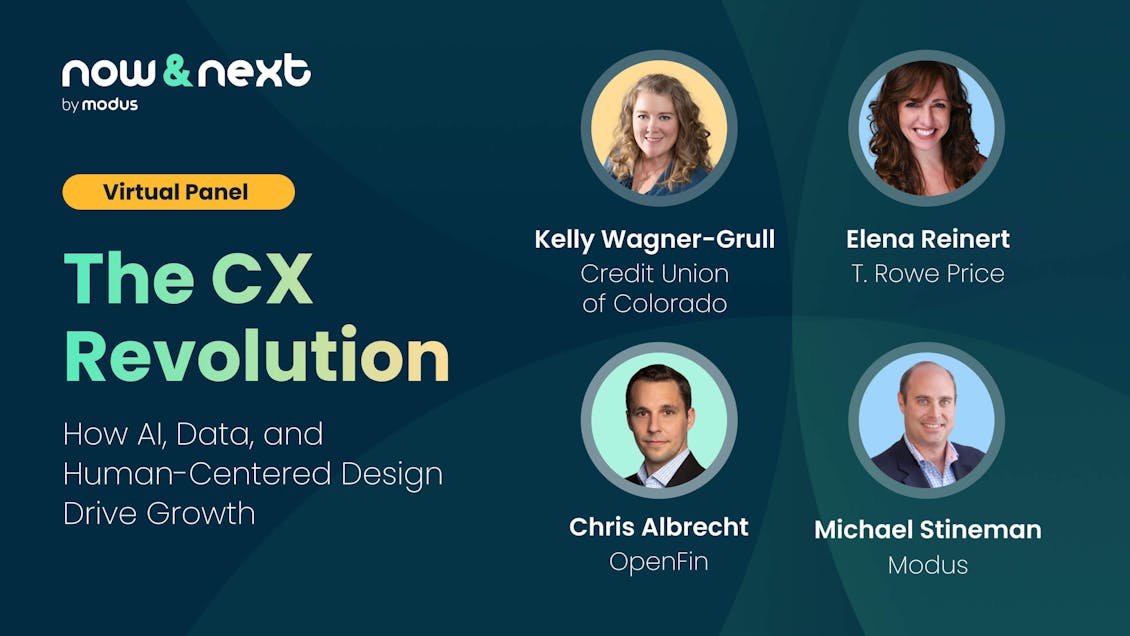4 key takeaways for enhancing customer experiences

As the financial services landscape continues to transform rapidly, leaders are presented with exciting opportunities and potential risks. With regards to AI usage, a staggering 87% of leaders anticipate that this technology will significantly enhance customer experience and engagement, as highlighted in the 2023 EY Survey on AI Adoption among financial services leaders.
In order to ensure the ethical advancement of AI-driven solutions that inspire confidence in individuals, businesses are incorporating human-centered design principles to understand customers' behaviors and actions at every stage of their experience. This holistic approach aims to elevate the overall experience, personalize interactions, and drive business growth.
From streamlining customer experiences to implementing innovative strategies with cutting-edge technologies, we engaged in an insightful discussion with several financial services leaders on how to deliver a next-generation customer experience.
The CX Revolution webinar
In case you missed it, the “The CX Revolution: How AI, Data, and Human-Centered Design Drive Growth” webinar unfolded on March 27, 2024. Hosted by Michael Stineman, EVP, Growth at Modus, this virtual panel discussion took attendees through the exciting transformations happening in customer experience (CX) including the use of AI, enhanced data analytics, and human-centered design. Panelists Kelly Wagner-Grull, Director of Member Experience, Innovation and Digital Services from Credit Union of Colorado, Chris Albrecht, SVP and CX Expert from OpenFin, and Elena Reinert, VP Self-Service, Individual Investors from T. Rowe Price shared their insights and experiences in navigating the evolving landscape of CX.
Starting the discussion, Michael Stineman shared his extensive experience in leading teams across product lifecycles, highlighting the need for measurable results and great user experiences to drive true business success.
Throughout this 30-minute discussion, the panelists explored several topics in depth, including:
- Effective strategies for dismantling silos and integrating CX transformation into the business roadmap
- Success stories of pioneering AI implementation
- Utilization of data by top organizations to enhance their CX
- The impact of human-centered design on personalization and self-service enhancements
Kelly Wagner-Grull discussed the intricacies of CX within a member-focused organization. She emphasizes the role of integrating data sources for personalized experiences, and the opportunity for increasing operational efficiencies through AI-driven automation, and leveraging AI to enhance security measures like fraud detection.
Adding to Kelly’s discussion points, Elena Reinert shared insights into the evolution of self-service and its impact on customer relationships. She discussed the shift from prescribed self-service to self-directed interactions, and how leveraging AI-driven conversations and personalized experiences have enhanced customer engagement and driven sales opportunities at her organization.
Diving deeper into the correlation between employee experience and customer experience, Chris Albecht underscored the need for unified tools and processes to drive user engagement and efficiency. He highlights OpenFin's approach to user-centric design within contact centers, streamlining workflows for better customer interactions.
Closing out the discussion, Michael Stineman provides insights into how other financial services institutions are starting with small improvements to their CX strategy, such as incorporating existing data to provide measurable improvements in a short period of time. He explains that this allows CX leaders to gain organizational buy-in, and continue to enhance their strategies with the use of AI, all while remembering that there is a human at the center of every experience.
Key takeaways for enhancing customer experiences
- Personalization through Data Integration: Start by identifying consumers across platforms using universal identifiers. Leverage AI and data analytics to analyze consumer behavior and deliver personalized experiences at scale.
- User-Centric Design in Contact Centers: Focus on designing efficient workflows and tools for contact center agents, incorporating feedback and real-time data to drive quick and effective resolutions for customers.
- Elevating Self-Service Experiences: Move from prescribed self-service to self-directed interactions, offering customers multiple pathways to achieve their goals. Use AI-driven conversations and personalized recommendations to enhance engagement and foster long-term relationships.
- Learning from Personal Experiences: Draw insights from your own experiences as a customer to influence the design of customer journeys. Consider different preferences for communication channels and tailor experiences accordingly.
It’s clear that the fusion of AI, data analytics, and human-centered design presents a unique opportunity to revolutionize customer experiences across all industries. By prioritizing personalization, efficiency, and continuous learning, organizations can stay ahead in delivering exceptional CX in 2024 and beyond.
Learn more
To learn more about the impact Modus has had on the financial services industry, be sure to view our Financial Services Case Studies. If you’d like to continue with discussion or have additional questions, please reach out to our host, Michael Stineman directly.
And, to keep up to date on the latest webinars and events, please sign up for our newsletter below.



